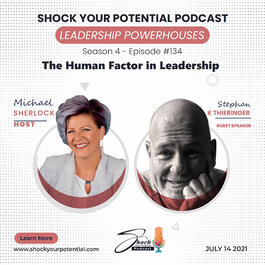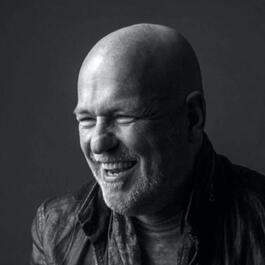
The Human Factor in Leadership - Stephan K Thieringer
“It is important to let people know that they matter, what they do for the company matters and giving them transparency on the impact that they have on the business.” Stephan Thieringer People are constantly faced with expectations from their environment which most often makes them feel pressured and as a result anxious. The pandemic has further catalyzed the situation considering the highly paced change and complexities that have arisen due to the crisis. This has resulted in many leaders pausing to reflect on how they can better lead to attain greater success as well as fulfillment. One of the ways they can bring purpose in practice is through embracing the human factor in their engagements with their people. Our guest today; Stephan Thieringer, believes that relationships should be built in accordance with human needs. Stephan K Thieringer is a Business Thinker, Innovation Strategist, and Executive Coach. His recent company, The Human Innovation Garage, is a leading coaching and advisory firm, working at the critical intersection of talent and business. Stephan has been recognized by the WHRC and WCC as a 2020 World’s 101 Top Coaching Leader and received various other global and national accolades. Stephan is passionate about inspiring people and transforming organizations and the culture of organizations. As a serial entrepreneur with many disappointments and failures and some successes, Stephan is passionate about reminding people of the human factor and creating a space for high performance buy being and living. Stephan has keynoted events around the world, engaged deeply in education technology and education impact, and equal access. He serves on several company boards, is an angel investor in over a dozen companies, and recently became a shareholder in a football club [soccer]. Stephan is originally from Stuttgart, Germany, and resides currently in Boston MA. In today’s episode, Stephan discusses the concept of humanity and why it should be embraced by every leader when they are interacting and building relationships with their people. Listen in! Socials https://www.linkedin.com/in/stephanthieringer https://www.instagram.com/stephan.thieringer/ https://www.facebook.com/humaninnovationgarage Human Innovation Garage is my company name and it explains what we do and also what we stand for in philosophy and value. [4:15] The factor of Human in humanity includes everything from humility to humanity and if we look at human beings and who we are on an individual basis, we can all find brilliance within us. [4:30] If we as human beings start looking at all the inherent brilliant pieces that we have and assemble them differently and be more tolerant and understanding of each other, it can be an important component of building a high-performance culture. [5:20] The third piece is ‘Garage’, whereby normally a garage has its tools, processes, structures, and procedures. [5:48] People need to have structure, what I like to call rituals and habituations. [6:00] One of the biggest pieces we miss and don’t talk enough about and companies are also afraid to talk about particularly after 2020 is trust. [9:02] From a very young age, we are very much a product of our surroundings. [9:34] What is fascinating to me in the work I do and I have done with people is the realization that everybody has the same issues. [10:05] The reason people are afraid to engage is the lack of clarity of what is the result for them because nobody gives them any kind of resources to draw that avatar of themselves. [10:40] A trigger is ultimately the awareness of what is happening in the moment of a given situation that a person is in. [11:28] When we give a keynote, we are not saying anything new but the way we phrase it hits somebody. [12:32] If there is something that you can connect with, it becomes real and meaningful and its absence makes people not engage. [12:50] When I work with organizations on how they give each other feedback, it’s more about how they clarify what they need and to what extent. [15:43] When it comes to relationships, it is not about ‘I need you to do,’ but rather it is about, ‘when you do it makes me feel,’ and this allows people to respond. [15:58] Tools are not just big box with hammer and nail and screwdriver but also is the structure and model of an empathetic conversation or clarifying information. [16:07] Work-life balance does not exist anymore, but rather work-life integration. [16:50] There is a traditionalist approach to micromanagement because my generation is used to having people in the organization, which makes us feel good. [17:08] We need to understand that there are five generations in the workforce, where the latest two are very comfortable working remotely. [17:38] The problem is that the people who manage them are not comfortable with the mode of working remotely. That is however not the way it is going to work. [18:02] I work with senior executives to find a way to help them not be triggered by the demands they are not comfortable with to ensure responsiveness, inspiration and that they will be willing to do much more than is required of them. [18:30] The unfortunate part is that CEOs almost need to permit employees to exercise self-care. [20:48] Trust is built by knowing that you care about me and my wellbeing. [21:03] Commercial break. [21:21] We have a lot of people who are actively disengaged where they choose not to do what they are asked by conscious choice. [27:20] It is important to let people know that they matter, what they do for the company matters, and giving them transparency on the impact that they have on the business. [27:35] Job fit and boss fit are the top reasons why people leave companies. [28:20] We did a survey which indicated that close to 70 percent of people who are employees said that their bosses were not managing them effectively. [28:32] What that says is that we don’t build relationships in accordance with what human beings need. [29:15] There are four E's in our lives and they are all fundamentally different which include Education Emotional, Experience, and Expertise. [32:40] If I accept that whatever perspective you are sharing comes from the 4 E's that are relevant to you, and I share from those that are relevant to me, there is absolutely no doubt that the perspectives will be fundamentally different. [33:06] It allows me to make space for that and inquire and shut down the judgment and dismissal. [33:26] When we talk about humans, the first human we need to talk about is ourselves. [35:56] When you think about the ‘if’ turn it into a ‘when’, and the when will become a commitment and becomes the requirement for you to make a strategy on how to get there. [36:06] …………………………………………………. Thank you to our July Sponsor: Entrepreneur’s Guide to Financial Well-Being Imagine starting a long journey without a map…or even a clear idea of the obstacles ahead. That’s exactly what it’s like for entrepreneurs who start companies with a lot of passion, but without the financial expertise to grow and scale their businesses and create long-term wealth for their families. Wayne Titus shows you how to find a financial adviser who can help you map a better journey. In his book, The Entrepreneur’s Guide to Financial Well-Being. With the right adviser at your side, you’ll have the freedom to focus on what really matters to you. Get The Entrepreneur’s Guide to Financial Well-Being at Amazon.com and in the virtual bookstore on the Shock Your Potential app.
From "Shock Your Potential"




Comments
Add comment Feedback